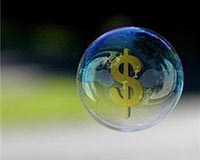| . |  |
. |
Beijing (AFP) Oct 21, 2010 China said Thursday its economy grew at a slower but still robust pace in the third quarter, which analysts said showed efforts to steer the country towards more sustainable growth were working. Consumer prices rose at their fastest pace in nearly two years in September, official data showed -- an apparent explanation for Beijing's decision this week to hike interest rates for the first time since 2007. Gross domestic product expanded 9.6 percent year-on-year in the third quarter, beating forecasts for 9.5 percent growth, according to the National Bureau of Statistics (NBS) data. The figure marked a decline from 10.3 percent growth in the second quarter and 11.9 percent in the first three months as Beijing started to withdraw stimulus measures introduced to combat the global crisis. The closely watched consumer price index, a key measure of inflation, rose 3.6 percent in September from a year earlier, the fastest pace since October 2008, and 0.6 percent higher than the previous month. "The overall economy remains sound, and the momentum of economic recovery is further consolidated," NBS spokesman Sheng Laiyun told a press conference. Sheng however warned there were still "many problems and difficulties" within China, adding Beijing needed to strike a balance between maintaining stable and sound development and managing inflationary expectations. Chinese shares closed down 0.68 percent over inflation fears while Hong Kong shares ended up 0.39 percent. Tokyo was flat. Analysts said the data should ease concerns that the world's second-largest economy -- which overtook Japan in the second quarter -- was heading for a sharp slowdown. "Policy measures put in place earlier this year appear to have helped steer the Chinese economy through a middle course between overheating and a serious downturn," said Brian Jackson, a Hong Kong-based senior strategist at Royal Bank of Canada. "Today's data provide further confirmation that the slowdown in Chinese growth is very moderate and that conditions are stabilising." Sheng said the slowdown in growth had tapered off, adding he believed expansion for the full year would exceed 10 percent. The inflation rate was above the government's annual target of three percent and was mainly due to rising food prices, Sheng said, after widespread flooding and an unusually hot summer wiped out crops. Beijing-based Citigroup economist Ken Peng said he expected inflation to exceed four percent this year -- but noted it was a level the economy "can easily stomach". Industrial output rose 13.3 percent in September from a year earlier, slightly slower than the 13.9 percent growth in the previous month as authorities cracked down on inefficient and highly-polluting factories to meet energy efficiency targets. Royal Bank of Scotland economist Ben Simpfendorfer said the data showed the economy was heading towards more normal, sustainable growth. "It is probably running a little bit too strong at nine percent, ideally eight percent would be more appropriate," he told AFP. Retail sales, the main gauge of consumer spending, rose 18.3 percent in the first nine months of 2010 compared with a year ago. China's fixed asset investment in urban areas, a measure of government spending on infrastructure and a key driver of growth, rose 24.5 percent in January-September, lower than the 24.8 percent growth in the first eight months as officials tightened lending restrictions. The data comes after Beijing raised interest rates for the first time in nearly three years as it ramped up efforts to contain rising inflation and cool the red-hot real estate market. Property prices and bank lending rose in September, defying official moves to dampen both, and fuelling fears of a damaging bubble and a potential new crop of bad loans. Central bank governor Zhou Xiaochuan warned that the risks of excessive liquidity, inflation, asset bubbles and bad loans would "increase significantly", in comments published Thursday. Zhou made the remarks at a meeting between the International Monetary Fund and central bankers in Shanghai earlier this week and they may provide some insight into the reasons that led the central bank to hike interest rates.
Share This Article With Planet Earth
Related Links The Economy
 Globalized Economy More Sensitive To Recessions
Globalized Economy More Sensitive To RecessionsHouston TX (SPX) Oct 21, 2010 By applying the same rules that explain how genomes evolve, Rice University physicists have shown that the world economy is more sensitive to recessionary shocks and recovers more slowly from recessions now than it did 40 years ago, due to increased trade globalization. Their findings are available online and will appear in an upcoming issue of the Physical Review Letters. "Standard ... read more |
|
| The content herein, unless otherwise known to be public domain, are Copyright 1995-2010 - SpaceDaily. AFP and UPI Wire Stories are copyright Agence France-Presse and United Press International. ESA Portal Reports are copyright European Space Agency. All NASA sourced material is public domain. Additional copyrights may apply in whole or part to other bona fide parties. Advertising does not imply endorsement,agreement or approval of any opinions, statements or information provided by SpaceDaily on any Web page published or hosted by SpaceDaily. Privacy Statement |